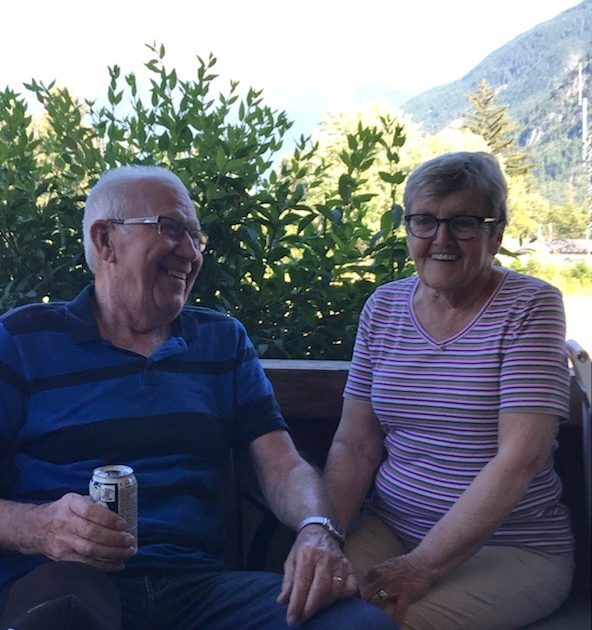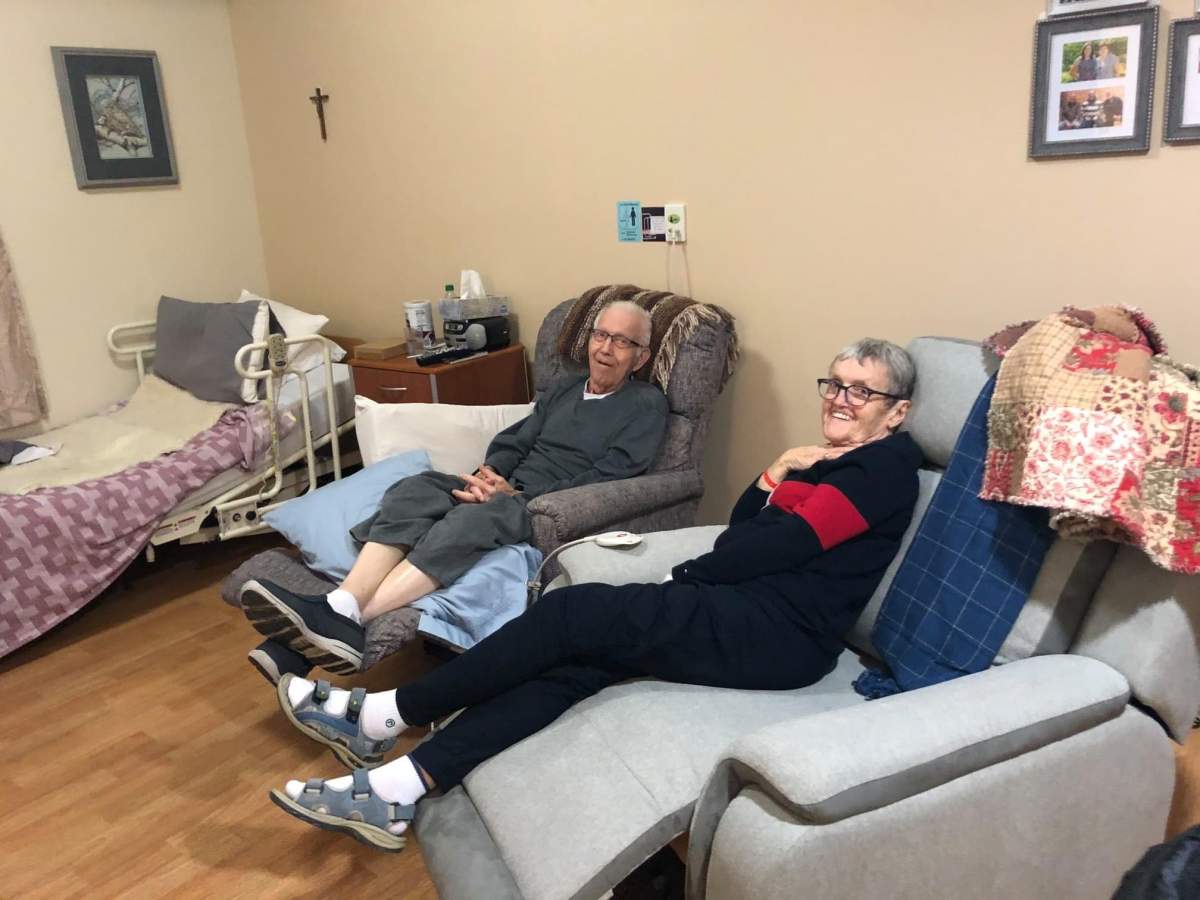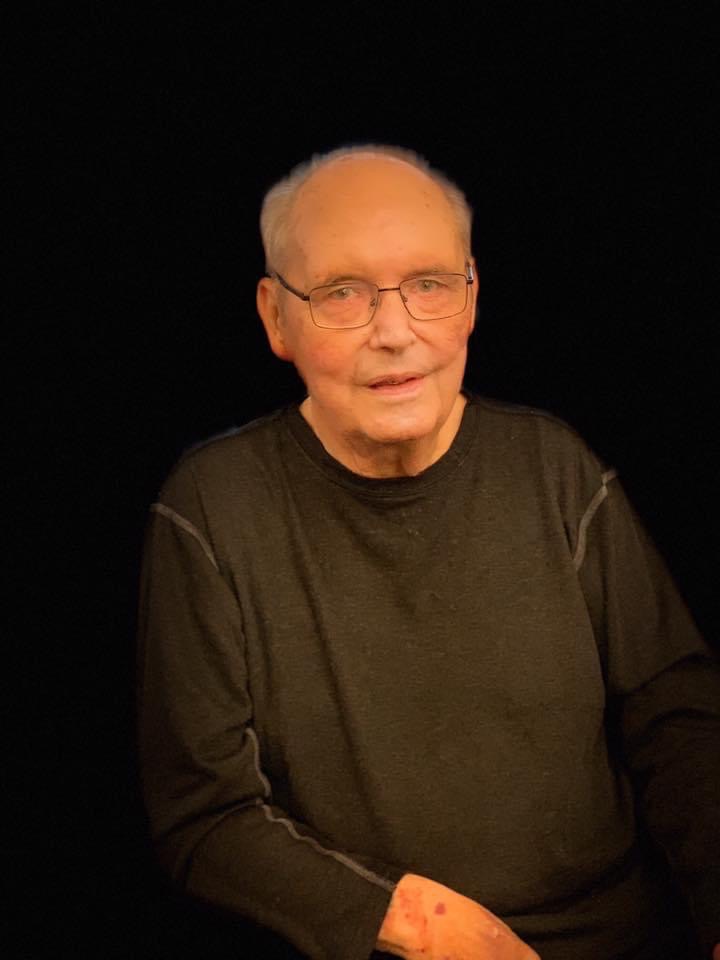Alberta health authorities have revealed another COVID-19 death of a resident at the McKenzie Towne Continuing Care Centre in Calgary.

A man in his 90s is the latest death connected to the home, bringing the death toll to 12. The news comes as concerned families continue to press for changes.
For Nina Vaughan and Renee Laboucane, speaking at a government press conference isn’t something they planned on.

Only 48 hours after losing a cherished mother and aunt, they are grieving.
But they said they felt compelled to share their struggles after 81-year-old Doreen Gauvreau died after testing positive for COVID-19. She was a resident of the McKenzie Towne facility.
Her daughter, Laboucane, wasn’t able to be by her side at the very end.
“We were really distraught being on the other side of the facility and not being able to communicate,” Laboucane said.

She is calling on all long-term care homes industry-wide to develop a plan for loved ones so they can stay in contact with their parents.
“I want the government to assist and act early if this happens in another facility. Communication is paramount in any crisis,” Laboucane said.
“Family members are fearful for the loved ones who are locked inside. Lack of information exasperated the situation.”
Laboucane’s father Sylvio also lives at the Mckenzie Towne facility. He, too, has tested positive for COVID-19 and is mourning the sudden loss of his wife. The family said he is physically stable but still sick in bed.
Sylvio’s brother-in-law Lorne Vaughan is a resident there too. Vaughan’s daughter Nina fears for them both every day.
“Despite the best of intentions, had they had those resources and had it been co-ordinated by the province early on, we could have prevented some of what’s happening there,” Vaughan said.

Get weekly health news
The two cousins have joined Alberta’s Official Opposition to advocate for change in the industry’s staffing.
Revera, the management company, has not replied to a request for comment but previously said it is continuing recruitment efforts and has hired 20 staff in the last week alone to help relieve pressures.
NDP Leader Rachel Notley said staffing levels at Mckenzie Towne were catastrophically low.
“It is very difficult given the high risk and low pay,” Notley said. “My first call is through surge funding to immediately provide hazard pay to front-line workers in seniors’ care facilities across the province.”
The NDP is calling on the provincial government to immediately provide a centralized response with hazard pay for workers in seniors’ facilities, priority access to personal protective equipment and stress tests for facility operators.

“There are critical lessons that must be learned by the provincial government and they must be acted on immediately to protect the lives of these residents and the lives of Albertans in seniors’ facilities across our province,” Notley said.
Notley asked for seniors’ homes to have priority access to personal protective equipment.
“In other provinces, we have seen the government use their emergency powers to take a more robust role in co-ordinating planning around this crisis in long-term care,” Notley said.
Provincial health authorities didn’t respond to requests from Global News on these latest calls to action, but on Monday, Alberta Health officials said no option is being ruled out.
Tom McMillan, a communications spokesperson with Alberta Health, said officials are monitoring the situation closely.
On Tuesday, Hinshaw ordered a provincewide ban on visitors to long-term care centres, licensed group homes and other facilities as part of the ongoing work to limit the spread of COVID-19. Under an amended public health order, no visitors will be allowed unless a resident is dying or the visitor is essential for delivering care that cannot be delivered by staff.
“I know this will have a profound impact on the lives of those residents and their families; this is not a step that we take lightly. I’m asking all Albertans to reach out and support their loved ones through the phone, video and any other means possible,” Hinshaw said.
“This order is an aggressive but necessary step to help limit the spread of COVID-19 and protect the health of vulnerable Albertans. Our government will support any action needed to protect the lives of residents at continuing care facilities across the province,” said Health Minister Tyler Shandro.
The new restriction applies to all licensed supportive living, long-term care and other continuing care facilities in the province. It also applies to all residential addiction treatment operators licensed under the Mental Health Services Protection Act.
Family, friends and religious leaders will still be allowed to visit a resident who is dying. In these cases, only one visitor can enter at a time and they cannot interact with any other residents while in the building. Exceptions will be made if an essential visitor is needed to provide specialized care for a resident.









Comments
Want to discuss? Please read our Commenting Policy first.